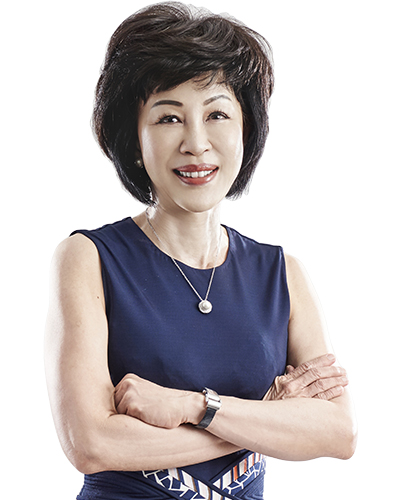Dr Christina Tai from Subang Jaya Medical Centre (SJMC) debunks the many myths and misconceptions surrounding birth control pills

Dr Christina Tai, Consultant Obstetrician and Gynaecologist from SJMC
There are many misconceptions when it comes to the tiny but mighty birth control pill. Tatler sits down with Dr Christina Tai, obstetrician and gynaecologist consultant at Subang Jaya Medical Center, to go through the things women should know before committing to the pill.
Through seminars and her practice, Dr Tai helps women to recognise and preserve their gynaecological health. She brings her 30 years of experience to the table as she answers essential questions, and takes us through birth control, its side effects, and its impact on women’s health.
The birth control pills options
As she explains, the birth control pill is a medicine that contains hormones to prevent pregnancy. Below, the term ‘oral contraceptive pill (OCP)’ is used interchangeably with ‘birth control pill’. Currently, there are three types of OCPs:
Combined oestrogen-progestogen pill
Progestogen only pill
Continuous or extended use pill
Photo from Unsplash
Do the side effects for hormonal birth control vary for different age groups?
Sixteen is the most common age for teenagers to start the pill, as most young women would have established a menstrual cycle by then. I personally avoid prescribing the OCP till two years after menarche (age of first period) to allow full growth potential.
For those trying to conceive, you may try as soon as you stop the OCP. However, the OCP can deplete levels of vitamins and minerals in susceptible individuals. It will be best to stop the OCP at least three months before trying to conceive and replenish with a good prenatal multivitamin and folic acid.
Are there any side effects from taking birth control pills for a prolonged period?
Extended use is when you take your birth control product for two or more cycles without stopping and then take a planned hormone-free break. You will have your period during this break and by doing this, you will have fewer periods. Reduced period frequency is desirable for women with dysmenorrhea and menstruation-related symptoms.
It is safe to take the pill for as many years as you like, either using the method with regular breaks, or the continuous method. The side effects are the same either way. If you're healthy and don't smoke, you can continue taking birth control pills after age 35. However, birth control pills aren't recommended if you're 35 or older, and smoke because of the risk of heart and cardiovascular disease.
What link does hormonal birth control have with endometriosis and Polycystic Ovarian Syndrome?
Endometriosis is a painful condition caused by the lining of the womb growing outside the uterus and bleeding without an easy escape route, triggering inflammation. Hormonal birth control pills help because they allow you to skip periods, and with time the endometriosis can regress.
Polycystic Ovarian Syndrome (PCOS) is one of the common endocrinopathies seen in gynaecological practice. The birth control pill has been the first line in therapy for concurrent treatment of irregular menses, acne, and hirsutism in women with PCOS.
The side effects of OCP such as weight gain, mood changes, and adverse effects on cardiometabolic risk factors may at times exacerbate the problems in women suffering from PCOS. Thus, before initiating treatment with OCP, thorough counselling is essential and should be backed up with stringent monitoring at every follow-up visit.
"The best contraception is the one that works for you, one that you are comfortable using and able to use consistently and correctly." - Dr Christina Tai
Which is better—hormonal or non-hormonal contraception?
What is best is what works for you, one that you are comfortable using and able to use consistently and correctly.
Your preferred method of birth control may change over your lifetime and is influenced by many different factors, such as reproductive goals, relationship factors, religious beliefs, costs, and more.
Choosing between hormonal versus non- hormonal birth control is a personal decision and should be an informed one. Some patients prefer non-hormonal contraception, such as barrier method or rhythm method, because they want to avoid side effects associated with hormonal options. Knowing your options is part of the decision process. You should speak to your doctor, do your research and compare before you start to use contraception.
What are other misconceptions about birth control that you would like to dispel?
The most common ones that patients generally inquire on are:
Risk of birth defects
There is good evidence that OCP will not cause birth defects or otherwise harm the foetus if a woman conceives whilst taking the OCP, or accidentally starts to take OCP when she is already pregnant.
The OCP can cause cancer
The use of OCP is proven to protect women from two kinds of cancer—cancer of ovaries and cancer of the lining of the uterus (endometrial cancer). This protection persists for 15 or more years after stopping use of OCP.
However, research findings about OCP and breast cancer are difficult to interpret. Both OCP users and women who do not use OCP can have breast cancer. For cervical cancers, the link between OCP use and cancer diagnosis is small. Cervical screening is readily available, providers can advise OCP users—and all other women—to be screened regularly with pap smears and HPV DNA studies.
Risk of infertility or a delayed return to fertility
Women who seek family planning may incorrectly believe that using OCP will cause a long delay in conceiving or prevent them from being able to have children in the future. OCP does not cause infertility. This is true regardless of how long a woman has taken the pill, the number of children the woman has had, or the age of the woman.
In fact, some of the non-contraceptive benefits of the pill include preserving fertility by offering protection against pelvic inflammatory disease, endometriosis, and ectopic pregnancy.
There is also no evidence that OCP will delay a woman's return to fertility after she stops taking them. Women who stop using OCP can become pregnant as quickly as women who stop using non-hormonal methods.
Malaysians can obtain OCPs over the counter without a prescription or mandatory consultation with physicians. What is your opinion on the current policy?
I feel very strongly that this policy should be reviewed, and that the OCP should not be readily available over the counter. Though I understand that the current policy allows the ease of accessibility and convenience, women who take OCP without medical supervision can put themselves at risk, as many are unaware of the contraindications for the OCP. I have seen many patients who have been taking the pill incorrectly for many years, which can result in unwanted pregnancies. Some patients have taken the OCP well after their 50s and wonder why they have not yet experienced menopause.
My concern is that we are giving OCP to women who have had no counselling, no risk assessment, and no guidance. Instead, it might be more beneficial for them to be prescribed birth control after a visit with a medical professional to reduce any risks. It could also lead to additional screenings and conversations, which promotes overall health.
What is your advice to those considering hormonal birth control pills as a contraceptive?
If you do choose an OCP, take it with a daily routine, for example, with breakfast or while brushing your teeth, to make it easier to remember to take it. The pill works best if taken at about the same time every day. This is especially important to prevent irregular bleeding or spotting.
Source:
1. Tatler Malaysia

